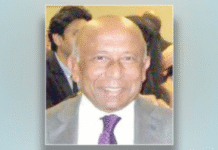
by Taj Hashmi 10 May 2023
During the Cold War, America strongly opposed the division of Pakistan because the Muslim-majority country was a valuable ally against the Soviet Union. After East Pakistan became Bangladesh with the help of India and the Soviet Union, the Nixon Administration did not show support for the new country. They believed that Bangladesh was closely aligned with Indira Gandhi, who was pro-Soviet and disliked by Secretary Henry Kissinger. In fact, Kissinger referred to Bangladesh as a “Basket Case”.
Following the violent removal of Mujib and his pro-Soviet regime in August 1975, the relationship between Dhaka and Washington shifted. The US became an active development partner of Bangladesh, while the World Bank, IMF, and various development agencies in the West had already implemented development projects in response to the devastating Famine of 1974. Throughout Bangladesh’s various elected and unelected regimes, Dhaka and Washington had a functional relationship until the Hasina Regime, known for its corruption and autocratic practices, had faced disapproval from the World Bank and Washington for attempting to solicit kickbacks during the Padma bridge construction project in 2012. The situation caused Washington to experience cold shoulder syndrome.
For a period of time, until China emerged as a development and security partner of Bangladesh following the controversial parliamentary elections in 2018, Washington and Dhaka had a positive understanding. It’s widely believed these elections were rigged and sponsored by Beijing to keep Hasina in power. After the rigged polls of 2018, China became the primary overseer of Bangladesh’s infrastructure development projects, obviously to the discomfiture of America and its allies in the West and East, including Japan. For several years, China has been the primary source of military equipment for the country, which is worth mentioning.
Meanwhile, the growing tension between China and Taiwan, the Russian invasion of Ukraine, and last but not least, China’s friendship with Russia and other adversaries of America have caused concern in Washington. It’s now important for the US to make a decisive decision about how to handle China, Russia, and their allies, such as Bangladesh. India’s relationship with Russia and its tense ties with China have mixed reactions in Washington. The US can’t openly support India’s relationship with Russia, but it also cannot afford to disengage from India, particularly in the event of a conflict with China.
Given the context, it appears that America is interested in establishing a military base in the Bay of Bengal, which is in close proximity to the strategically important Strait of Malacca, likely as a response to China’s actions. The unanswered question is whether Matarbari will serve as a transit for India and a military base for America! The agreement between Japan and Bangladesh to build a deep-sea port at Matarbari using Japanese funds and expertise was preceded by Sheikh Hasina’s recent statement in parliament on April 10th. In her speech, she criticized the US for engaging in “regime change” operations in Muslim-majority countries and accused them of being a nasty hegemonic power. Sheikh Hasina also mentioned that the Biden Administration was annoyed by her refusal to grant the US a military base in the Bay of Bengal.
However, seemingly, Japan is acting as a “distant NATO member” in the best interests of America, which consequently benefits India. However, Bangladesh may not benefit much from this arrangement and could potentially still be targeted by China if tensions escalate between China and America. The proposed deep-sea port in Bangladesh will not bring significant profits to the country either. Despite using Bangladeshi roads, railways, and rivers for transportation between Kolkata and Agartala, India’s transit fees are much lower than what experts predicted in 2010. Therefore, building another transit at Matarbari will not benefit Bangladesh financially. The country will also have to bear the expenses of maintaining the port and repaying the loan to Japan for its construction. This situation puts Bangladesh in a difficult and risky position.
To achieve success in Bangladesh, the US needs to negotiate with India. Recently, Derek Chollet, Counsellor of the State Department, travelled from Dhaka to Delhi to facilitate these negotiations. Prime Minister Kishida did the same thing. Recently, he went to Delhi to meet Prime Minister Modi days before Hasina’s state visit to Japan. The US is also allowing Japan to construct a deep-sea port in the Bay of Bengal that won’t be operational for several years. However, these facilities could potentially serve as a naval base for the United States. The construction of the port is believed to be a tactic for the United States to exert pressure on China. Additionally, it appears that Japan’s Prime Minister Kishida’s recent meeting with Modi in Delhi suggests that the port will also serve India as a transit point to connect its landlocked Northeast with the Indian Ocean.
The Matarbari project is expected to positively impact India’s economy, potentially transforming its Northeast region into a thriving industrial hub. This could lead to better political integration of the “Seven Sisters” in the Northeast with India. Additionally, a more integrated India would be less vulnerable to Chinese invasion and could stabilize the region. However, unless America, Japan, and their allies invest significantly in industrialization in and around Matarbari, there may be little benefit for Bangladesh. The country would only have a deep-sea port and a large debt burden for decades, similar to Sri Lanka’s situation. Bangladesh’s decision to permit India to use alternative transit routes through Bangladesh and Matarbari to the Siliguri Corridor, also known as the “Chicken Neck,” may result in Chinese military retaliation against the country. The Hasina Administration has been criticized by the Chinese Ambassador for getting too close to some “Third Countries” (US and Japan) that are hostile towards China. Such criticism suggests that retaliation is a probable outcome.
Some analysts and experts might believe that America may be considering the establishment of a military base in the Bay of Bengal with Japan’s help. However, we should ask ourselves if this is the best course of action for Bangladesh. Additionally, we should consider if a deep-sea port is necessary and if Matarbari can replicate Singapore’s success. The answer to both of these questions is “No”. Bangladesh already has two seaports, Chattogram and Mongla, which are more than enough. This is clear from the fact that Bangladesh has proposed to India to use their existing seaports.
It’s time to contain China which has no qualms with promoting brutal autocratic regimes across the world. Tibet and Xinjiang are glaring examples of gross violations of all principles of democracy, freedom, and human rights within its annexed territories. China’s public support for the Russian invasion of Ukraine is another example in this regard. We know rogue and pariah regimes in North Korea, Myanmar, Cambodia, and among others, Bangladesh, wouldn’t have survived without China’s support. Having no respect for people’s right to self-determination, China wants to annex Taiwan. Last but not least, China’s not-so-subtle threats to India to grab chunks of its territory in the name of “undoing the past mistakes” aren’t congenial to global peace and order. As “regime change” by any superpower is obnoxious, so is any threat to alter the political geography of sovereign nations in the post-World War II era deplorable.
In the past, military pacts and bases strategically located have been used to contain rogue powers. However, it is important to respect the sovereignty of each country and consult with them before establishing a military base. In a democratic society, the majority should have the final decision. No country should be forced to sign an agreement allowing a foreign military base. Unfortunately, the unelected Hasina Administration failed to publicly discuss the deep-sea port project with Japanese assistance, leading to speculation about the potential for a US military base in the Bay of Bengal. Transparency builds trust and lack of trust can lead to conflicts and wars. In summary, Hasina’s unpopularity in Bangladesh and diplomatic failures have caused an imbalance.
In summary, Hasina’s lack of popularity in Bangladesh and her failure to maintain a balance between the US and China have weakened her leadership. By favouring America and Japan, Hasina has alienated China, as evidenced by the Chinese Ambassador’s warning to her regime. The Matarbari project could be detrimental to Hasina’s corrupt leadership, while benefiting Delhi, Washington, and Tokyo. There is a possibility that a pro-Chinese military coup may remove her from power.
Taj Hashmi, Ph.D., FRAS is a historian-cum-cultural anthropologist, and is a retired professor of Security Studies at the APCSS, US. Author of five books and hundreds of journal articles, and newspaper op-eds, he is an analyst of current affairs. As a human rights activist he regularly appears on talk shows about Bangladesh, South Asia, and World affairs on various TV and YouTube channels. His latest book, Fifty Years of Bangladesh, 1971-2021: Crises of Culture, Development, Governance, and Identity, was published by Palgrave-Macmillan in May 2022. He lives in Toronto, Canada. Telephone: 1 647 447 2609 — Email: tajhashmi@gmail.com
Originally published in http://southasiajournal.net/matarbari-a-deep-sea-port-an-indian-transit-or-a-us-military-base-in-bangladesh/









